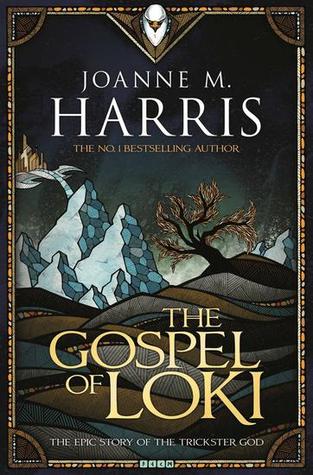“The Gospel Of Loki” by Joanne Harris — Reviewed by Andrew Robins
 Book Review:
Book Review:
The Gospel Of Loki by Joanne Harris — Reviewed by Andrew Robins
Gollancz, 2014, Trade paperback , 302 pp
The Gospel Of Loki is a highly accessible retelling of the Norse creation cycle myth.
Much of the source material is derived from the poetic Eddas that are themselves based upon the oral traditions of the ancient Nordic skalds.
If you are familiar with the Eddas, and the stories that derive from them, then most of your enjoyment of this book will be in the retelling of them “slant”.
The story is told from the perspective of Loki, and is his attempt to “set the record straight” and counter some of the bad press he feels he has received at the hands of a largely ungrateful set of Aesir and Vanir “gods” who have wronged him, betrayed him, annoyed him and failed to accept him or acknowledge their need for him.
Loki’s story is episodic in nature, but shows a consistent progression from creation towards destruction.
Most of the characters that share the stage with Loki are fairly two dimensional, but the character of Loki, and his primary antagonist, Odin, are well drawn. The strengths and weaknesses of both are on display for the reader, and there is a complex, developing relationship to explore.
This relationship was the aspect of the story that I most enjoyed. The cornerstone themes of mutual need and ultimately, mutual betrayal, kept me engaged with the story until the end.
There were some rough patches towards the middle of the book where I thought to myself, “Just why is Loki spending so much time with that idiot, Thor”—a question that was never satisfactorily resolved by the story—but this is a minor quibble.
The language employed in The Gospel Of Loki is contemporary, which may jar some readers. I did not care for it myself, but believe it suits the style of story being told: a ‘slantwise’ look at the traditional myths, which focuses on Loki as an antihero, which is also a very modern approach.
The author did a good job of working the various different story threads into a consistent narrative. We understand why Ragnarok happens, and why Loki chooses the side he does, even knowing what he knows and what his fate is likely to be.
Spoiler Alert! Given that this is Ragnarok we are talking about, the fate of all is pretty dark, so if you are looking for an optimistic read, then this is not the book for you.
But this is a clever story told in a clever way, by a clever author. Reading this I was reminded of Roger Zelazny’s Jack of Shadows and Phyllis Ann Karr’s Robber Girl. So if you are the kind of reader who enjoys a good anti-hero (and who doesn’t?), then this could be a book for you.
—
About The Reviewer:
Andrew Robins is a long time reader – and sometime reviewer – of science fiction, fantasy and history. People pay him to test stuff, which most of the time is more fun than it has any right to be.
To read more reviews by Andrew, see “Book Reviews for ‘on Anything, Really’” in the right-hand side bar. Recent examples include:







